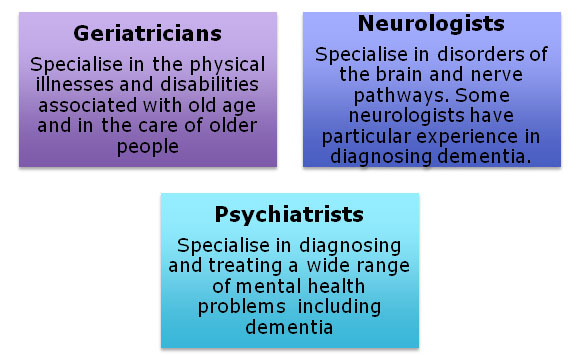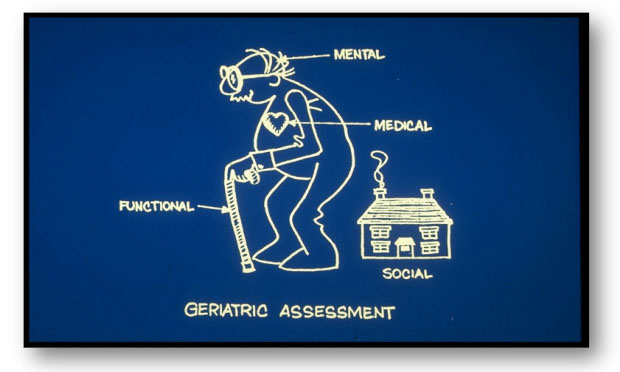Dementia comes from Latin DE meaning APART MENS from the genitive mentis meaning MIND.
WHAT IS DEMENTIA?
Dementia describes a collection of symptoms that are caused by disorders affecting the brain. It is not one specific disease. According to the Diagnostic and Statistical Manual of Mental Disorders (DSM) Dementia is defined as follows: “the development of multiple cognitive deficits that include memory impairment and at least one of the following cognitive disturbances: aphasia, apraxia, agnosia, or a disturbance in executive functions. The cognitive impairment must be sufficiently severe to cause impairment in occupational or social functioning and must represent a decline from a previously higher level of functioning”.
WHAT ARE SYMPTOMS OF DEMENTIA
These include asking the same questions repeatedly; becoming lost in familiar places; being unable to follow directions; getting disoriented about time, people, and places; and neglecting personal safety, hygiene, and nutrition. People with dementia lose their abilities at different rates.
DEMENTIA IS NOT:
- part of normal ageing
- contagious
- something to be ashamed of or hidden away
- something that you have to face alone
WHAT CAUSES DEMENTIA ?
Dementia is caused by damage to or changes in the brain. A variety of conditions can cause dementia, including injuries to the brain from tumors, head injury, or stroke; diseases, such as Alzheimer’s disease; or long-term alcohol dependence. People (especially older adults) who are depressed may seem to have dementia when they do not (pseudodementia).
DEMENTIA EPIDEMIOLOGY
Usually dementia occurs in people who are 65 or over. It is rarely diagnosed in the under 40s. By the age of 80 about one in five are affected. Dementia is slightly more common in women than in men.
DEMENTIA DIAGNOSIS
For individuals experiencing memory problems, a comprehensive diagnostic evaluation is the first step toward determining the nature and significance of the problems, and getting the right care. Memory problems can result from many different medical conditions, including Alzheimer’s disease and Mild Cognitive Impairment, or they can be a result of normal aging (age-related cognitive decline). A diagnostic evaluation is the only way health care providers can assess a person’s condition and provide an accurate diagnosis
WHY GET A DIAGNOSIS?
A proper diagnosis of dementia is essential, in order to:
- rule out other conditions that may have symptoms similar to dementia and that may be treatable, including depression, chest and urinary infections, severe constipation, vitamin and thyroid deficiencies and brain tumors
- rule out other possible causes of confusion, such as poor sight or hearing; emotional changes and upsets, such as moving or bereavement; or the side-effects of certain drugs or combinations of drugs
- access advice, information and support (emotional, practical and financial) from social services, voluntary agencies and support groups
- allow the person with dementia to plan and make arrangements for the future.
WHO MAKES THE DIAGNOSIS?
General Practitioner
- If you are concerned that you, or someone you are close to, may have dementia, the first person to consult is the GP.
The GP will assess the person through - Analysis of background information
- Physical examinations and tests
- Mental tests
- The GP is the usual person to make a referral to a specialist. A consultant will have more specialised knowledge and experience of dementia than the GP, and will have access to more specialised investigations, such as brain scans and memory testing. The main types of consultant are as follows:

A DIAGNOSTIC EVALUATION GENERALLY INCLUDES THE FOLLOWING COMPONENTS:

Psychometric testing: Psychometric tests objectively measure cognitive performance the accuracy, speed, and quality of various aspects of mental processes. These include tests to assess functions such as immediate and delayed memory, attention, language, executive function, and problem solving.
Neurological examination: A neurological examination assesses language, gait (how a person walks), coordination, reflexes, and sensory perception as they are affected by changes in brain function.
Physical examination: A complete physical examination is performed and includes an electrocardiogram and blood and urine tests. These tests determine the presence or absence of conditions that may cause or aggravate memory deficits. Such conditions include thyroid conditions, vitamin B12 deficiency, electrolyte imbalances, high blood pressure, and heart arrhythmia (rhythm disturbances).
Psychiatric evaluation: This part of the diagnostic evaluation involves assessments that focus on cognition (memory, concentration, and orientation) and how it affects a person’s ability to function in daily activities. It also includes assessments focused on behavior and mood, which may cause memory problems, as well as information about the person’s past medical and psychiatric history.
Neuroradioimaging:
- Computerised axial tomography (CT) First –line examination to rule out causes of surgical and thus reversible, dementia such as subdural hematoma or normal pressure hydrocephalus
- Magnetic resonance Imaging (MRI) Magnetic resonance-based volume measurements of atrophy are potential markers of the progression of Alzheimer’s disease, starting from the preclinical stages.
TYPES OF DEMENTIA
Dementia is the umbrella term for a number of neurological conditions. There are over 100 diseases that may cause dementia.
A primary reason that accurate diagnosis is so important among people exhibiting cognitive problems is that some causes of cognitive impairment are reversible.
- Reversible Cognitive Disorders
Reversible conditions creating cognitive problems include pseudodementia, medical conditions, and delirium
- Pseudodementia
Pseudodementia is a situation where a person who has depression also has cognitive impairment that looks like dementia. Pseudodementia is not permanent;
once a person’s depression is successfully treated,his or her cognitive symptoms will go away as well.
- Medical Conditions
Common reversible conditions that can cause cognitive impairment include thyroid problems, dehydration, malnutrition, infections, or problems with medications.
- Delirium
One of the most common reversible cognitive disorders is delirium, which is a sudden and drastic change in the ability to focus attention. People also become extremely confused about where they are and what time it is. Delirium is caused by an acute (short term) medical condition that either disrupts brain metabolism (i.e., the brain’s process of creating and using energy) or alters the level of neurotransmitters (chemical messengers in the brain and nervous system).
Both types of disturbance can significantly affect brain functioning. If the cause of delirium is properly identified and treated, delirium often lasts less than one month from the onset of symptoms to the time of recovery. However, an episode of delirium may last anywhere from a few hours to many weeks, depending on the cause and necessary treatment.
IRREVERSIBLE TYPES OF DEMENTIA INCLUDE:
- Alzheimer’s Disease
- Mixed Dementia
- Lewy Body Dementia
- Vascular Dementia
- Frontotemporal Dementia
